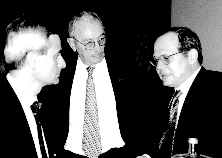
 |
Bologna Center:
Michelle Jeffress |
Tiziano Treu, Italy's minister of labor and social welfare,
inaugurated the 1997-98 academic year at the
Bologna Center, the
European branch of Hopkins'
Nitze School of Advanced
International Studies, on Friday, Oct. 10, with a lecture on
"The
Role of a European Social Policy." The future of social welfare
policies is a burning issue these days as European governments
search for ways to lower budget deficits while continuing to meet
social welfare obligations.
 (Left to right) Adjunct professor Marco Biagi, Bologna Center director Robert H. Evans and minister of labor and social welfare Tiziano Treu at the center's academic year inauguration earlier this month. Interest level in Treu's talk was already high among the students, faculty and staff, and special guests packed into the school's auditorium that evening. But the appearance of the local press just prior to Treu's arrival confirmed that something else might be occurring. The day before, Italy's prime minister, Romano Prodi (who delivered last year's inaugural address), had publicly announced his resignation, thereby capping a week-long government crisis. The latest crisi di governo was provoked by the leader of the Refounded Communist party (Rifondazione Comunista), Fausto Bertinotti, who had withdrawn support from the coalition government, headed by Prodi, over differences in the social welfare budget proposed for 1998. Bologna Center director Robert Evans alluded to the crisis in introducing Minister Treu, noting his appointment as minister in 1995 and subsequent service in two successive Italian governments. Evans expressed the hope that the minister--a lawyer, teacher and widely acknowledged expert in the fields of comparative labor law and industrial relations--would be part of the next government. That night, the press, at least, were disappointed, as Treu stuck to his topic, reiterating the need for a unified social and labor policy within the context of the European Union. "Because of globalization," he said, "the national dimension is less and less significant in understanding social affairs." Though he warned against using approaches too local in nature for solving social problems, he suggested that solutions should not be too global in scope. Attempting to analyze industrial and labor relations at the global level would be "too chaotic," he said, suggesting, instead, that the European Union was the perfect compromise between local and global approaches. "The EU could prove to be the ideal setting in which to create comprehensive, transnational social and labor policies," he said. Treu tempered this optimism by noting that in the past few years the European Union had succeeded only in outlining general goals for a unified social and labor policy, leaving specific decisions about implementation of the policy goals to the individual nation-states. Today, he said, there is a move away from adopting general objectives toward creating "more precise guidelines for action." The major challenge facing Italy and other European states, Treu said, is preparing their economies to merge in the European Monetary Union. In order to meet the economic guidelines for membership, he noted, Italy must face tough economic choices. He advocated being more selective in public expenditures, rather than depending on increased taxation to meet the criteria. To increase productivity and decrease unemployment, he continued, Italy needs to move toward "modernization and flexibility in the job market." He warned, however, that "an overdose of flexibility will result in insecurity [of the work force], and the cost of such insecurity must be calculated." Even some of Europe's left-wing parties, he noted, have come to realize that governmental over-regulation of the economy can burden the marketplace, limiting growth. He stressed that European governments had to evaluate carefully the continuation of the generous welfare policies of the post-World War II era. Echoing a refrain that has become popular in the United States, Treu predicted that there would be a progression from "welfare to workfare." Again, however, he stressed that any move toward liberalization of the Italian economy had to "keep in mind the culture of [labor force] insecurity." European states, he said, generally place a high value on maintaining the "relative security" of their populations. Therefore, any action by the Italian government which could be perceived as moving too quickly toward complete liberalization of the marketplace and away from the social safety net must be approached with great caution. In order to maintain a competitive market economy, the minister concluded, European states needed to balance the move toward a less regulated marketplace with their traditional support of the welfare state. For us in Italy, there's a happy ending to the political imbroglio: The government crisis was resolved in a record 48 hours when Prime Minister Prodi and Fausto Bertinotti patched together a compromise over spending cuts. With a few minor concessions, the neo-Communist party agreed to support Prodi's 1998 budget, which will allow his government to continue its course toward European Monetary Union and institution of a common currency in 1999. Minister Tiziano Treu's chances for continuing his political career look equally promising. Note: Michelle Jeffress is a student at the Bologna Center.
Go back to Previous Page
|